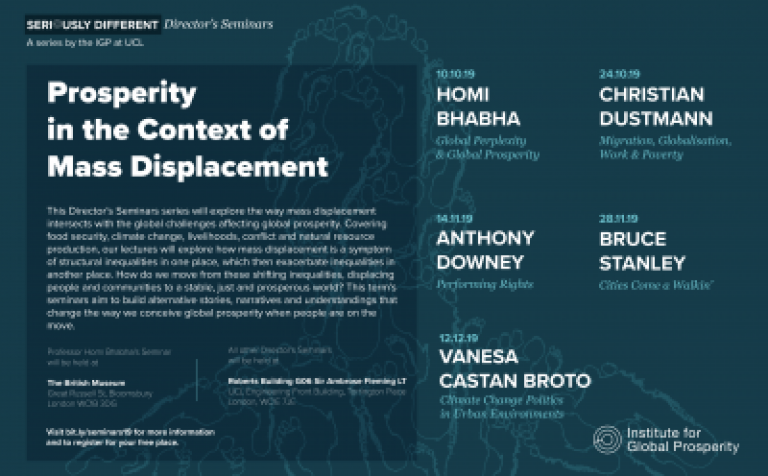Director's Seminar: Climate Change Politics in Urban Environments
12 December 2019, 4:00 pm–6:00 pm

The IGP welcomes Vanesa Castan Broto (University of Sheffield) for a Director's Seminar.
Event Information
Open to
- All
Availability
- Yes
Organiser
-
Annelise Andersen
Location
-
Roberts Building G06 Sir Ambrose Fleming LTUCL Engineering Front BuildingTorrington PlaceLondonWC1E 7JE
About The Speaker
Vanesa Castán Broto, University of Sheffield
Vanesa joined the Urban Institute in September 2017, following her appointment as a Professorial Fellow in the Faculty of Social Sciences. Her research has been funded by the British Academy, Leverhulme Trust, ESRC, EPSRC and the Institution of Civil Engineers.
In 2016 she received the Philip Leverhulme Prize for contributions to Geography. In 2013 she received a United Nations Award for Lighthouse Activities that contribute to fight climate change with a focus on the urban poor.
About The Seminar
The great urban transformation has become a defining processes of our era, alongside climate change. Since 2010 more than half of the people live in cities and urban areas. Rural-urban migration and large scale migration (often linked to natural resources conflicts and climate change) take place alongside endogenous growth, creating a transformation without precedents in human history. This urban transformation involved complex processes beyond population growth and changes in the urban extent: urbanization is a multidimensional process that entail multi-layered changes in lifestyles, styles of living, governance, and the built environment. Recent research has highlighted that the development of heterogeneous infrastructure system is at the heart of urban development, and creates deep social and economic inequalities which parallel systems of service provision in urban environments.
Scholars and policy makes increasingly portray urbanization and urban transformations as a moment of opportunity. Much emphasis has gone into thinking how processes of urban change can be mobilised to build resilient urban areas, which depend on low carbon, sustainable, infrastructure systems. For example, UN-Habitat calls now for policies that harness the transformative potential of (planned) urbanisation to deliver environmental value. This follows on from a ‘wave of urban optimism’ (Parnell, 2016) that followed the adoption of a Sustainable Development Goal on cities and settlements (SDG11) and the New Urban Agenda.
 Close
Close


 This event is part of Bartlett 100, a year-long celebration in 2019 to mark 100 years since the naming of the faculty.
This event is part of Bartlett 100, a year-long celebration in 2019 to mark 100 years since the naming of the faculty.